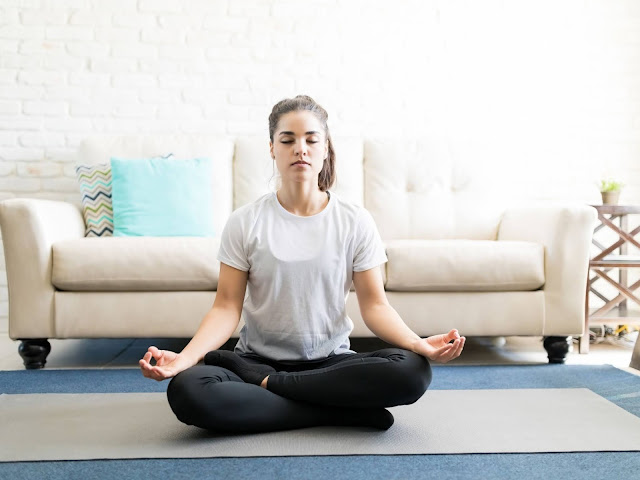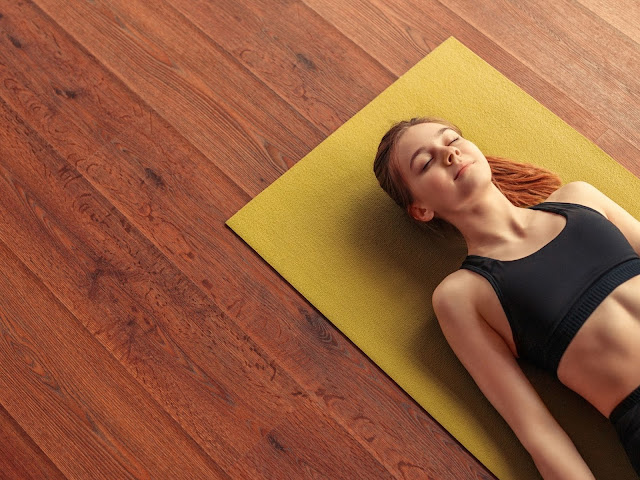Best Time Of Day To Meditate
People often wonder when the best time to meditate is. There is never a bad time to meditate. Unless you're barrelling down the highway at 120mph. But as long as you're in a comfortable spot where you can relax, taking a little bit of time to focus on your breath and find calmness can be a good thing.
For the purpose of this article, we are going to talk about the most beneficial times to meditate, and how coming up with a meditation routine will ensure that you experience all the benefits of meditation.
The Ideal Time To Meditate is When You Wake Up Or Before You Sleep
Meditation in the Morning
Some yogis suggest that the ideal time to meditate is between 3am and 6am. The reason for this is because generally, there are fewer distractions, the world is still very much asleep around you, and you can connect on a deeper level. However, not everyone lives a lifestyle where getting up that early is possible.
No matter what time you arise, your brain doesn't quite switch to high alert mode until you get up and start engaging with your physical surroundings. For that reason, if you are able to set aside a few minutes to center yourself and focus on the kind of day you want to have right away, you can come out of a morning meditation carrying more peace, love, kindness, and hope through the remainder of your day.
Imagine if every day started with focusing on calmness, relaxation, kindness, and other emotions you wanted to feel more of. How many more days would you display your desired emotions and behaviors with less effort?
Meditation Before Sleeping
Comparatively, when you're about to fall asleep, your brain is more open to suggestions and is generally in a more relaxed state. If you're not relaxed before bed, taking a few minutes to find more stillness may allow you to drift off to sleep easier and stay asleep longer.
By listening to a guided meditation, or a recording of affirmations, your brain can drift off to sleep with positive suggestions that will help to reprogram the mind towards thoughts and emotions that are more in line with what you want to accomplish and how you want to feel.
As Joseph Murphy talks about in his book "The Power of The Subconscious Mind," some long-time meditation practitioners will attest to becoming calm before bed and focusing their attention on the resolution of an issue they are struggling with. During the night, the subconscious mind can take suggestions given to it right before sleep and offer a solution when the person wakes.
So, the most ideal time to meditate would be between 3am and 6am, but when you wake up, or when you are about to fall asleep are also fantastic times to practice a 20-minute-mindfulness meditation.
However, there is more to the story. If meditating in the morning or at night doesn't work for you, then...
The Best Time to Meditate is Routinely
People experience the greatest benefits of meditation when they practice it on a regular basis. Meditation offers additional benefits over time. Here are some of the main benefits you could experience from a routine meditation practice:
- Reduced stress
- Reduced anxiety
- Increased presence
- Better emotional health
- Increased grey matter in the brain
- Heightened self-awareness
- Prolonged attention span
- Improves sleep
- Reduces memory loss
- Improves focus
Finding time to meditate on a daily basis, or every second day is the most beneficial way to go about meditating because it will help build positive habits over time. Before long, you may notice that 20-minute mindfulness meditation is something as routine as brushing your teeth in the morning.
If you had to make a choice between WHEN to meditate as opposed to WHETHER to meditate, the decision choice always is to do it whenever you can instead of not doing it at all because you missed your morning practice.
There is never a bad time to meditate. The beautiful thing about meditation is that you experience immediate benefits within a couple of minutes. All it takes is 2-3 minutes for a beginner to start to feel a greater sense of calm and relaxation.
How Long Should You Meditate For?
There is a funny saying that is also very true that says "You should meditate 20-minutes every day. Unless you're too busy. Then you should meditate for an hour." What this means is that if you're noticing yourself becoming easily disturbed and have trouble keeping calm, then meditation is even more important for you.
There is no one size fits all situation for meditation. The important thing is that you meditate in the first place. But, that doesn't mean you can't experience more benefits, find deeper relaxation, and connect more genuinely by spending a little more time in silence and reflection.
Many devoted meditators will shoot for somewhere between 10 and 30 minutes every day. It doesn't take up too much time and it offers a real chance to take enough time to disconnect from your outer environment and focus on relaxation and mindfulness. If you have a little more time and you want to meditate for an hour or more, then you may find that you are able to connect and relax on a much deeper level than with less time.
Another thing to consider with the question of how long should you meditate is that meditation can be seen as an exercise for the mind. Beginners are taught to continuously bring their attention back to the present moment whenever it begins to wander. Every time you bring your attention back and focus on the present moment, it is akin to performing a mental repetition. The more often you are able to bring your mind back, and the longer you are able to stay present with the emotions or thoughts you're trying to cultivate, the more accustomed your brain will become to thinking and feeling this way.
Dr. Joe Dispenza, a leader in new age meditation and brain research talks about brain circuits firing and wiring together. The more often you fire a circuit, the stronger it becomes, and the easier it is for your brain to find that connection again. Thus, by meditating and practicing firing the circuits related to relaxation, joy, peace, and hope, more often, your brain will reprogram to fire those thoughts and emotions by default more easily.
Can You Meditate Too Much?
Meditating too much is another topic that is relative to a person's situation. Consider the fact that monks spend the majority of their days meditating and experience miraculous benefits from this practice. Of course, this is not the ideal situation for most of us.
You should meditate as much as you feel is necessary. If you're routinely feeling stressed out with a lot of brain fog and have trouble focusing, then you may benefit from a little more meditation. Conversely, if you're starting to notice the benefits of regular meditation practice, and you want to see what meditating longer can do for you, then there can be no negative consequences, as long as the extended time doesn't affect the life that you want to lead.
Meditation is a Type of Mental Rehearsal
Have you ever found yourself in a stressful situation and found it hard to calm your mind down? The main reason for this is because you have not trained your mind to stay in a calm state and have ended up reacting to a situation or a circumstance.
Sometimes, life can catch us off guard, even for people who would consider themselves very mindful. When that happens it is natural for the body and brain to go into survival mode and react.
However, by meditating regularly, it is possible to rehearse the feelings of being calm, grounded, and centered. The way you train your mind is how it will respond in your everyday life. If you meditate and build a foundation and baseline of being a calm, centered, and relaxed person, then whenever stressful situations come up, you will already be tuned to calmness, instead of trying to fight your way to it when you need to.
As you rehearse, your mind will begin to accept those emotions and thoughts as your natural baseline and will carry that energy through the rest of your day. If you start to notice yourself becoming more easily irritated, or anxious, you could benefit from making meditation a little more routine.
The Bottom Line
The best time to meditate is when it works for you. The length of the ideal meditation is what will allow you to find the calmness you desire. Doing it for 3 minutes is better than doing it for no minutes. However, if you want to play around with more advanced ideas such as meditating between 3am and 6am, you may be able to experience things that you never thought were possible.
At Flow and Go Yoga, we routinely offer meditations after our 20-minute yoga flows to help you find calmness and mindfulness. Feel free to stop by and try out some of our live flows and meditations.
Sources:
Wikipedia - Joseph Murphy - https://en.wikipedia.org/wiki/Joseph_Murphy_%28author%29
Mayo Clinic - Benefits of Meditation - https://www.mayoclinic.org/tests-procedures/meditation/in-depth/meditation/art-20045858#:~:text=%22Meditation%2C%20which%20is%20the%20practice,disease%20and%20high%20blood%20pressure.
Janice Brown
Janice is a respiratory therapist and yoga instructor in Canada. She is the owner of Flow and Go Yoga where she offers daily live yoga classes and meditations to inspire people with yoga they can do every day.



Comments
Post a Comment